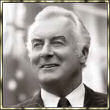

Edward Gough Whitlam was born in Melbourne in 1916, and raised in Melbourne, Sydney and Canberra, as his father pursued a career in the Commonwealth Crown Solicitor's Office.
Whitlam studied law at Sydney University before enlisting in the Royal Australian Air Force following the entry of the Japanese into World War II. He received his call-up in May 1942.
A member of the Australian Labor Party (ALP) from 1945, Whitlam entered the House of Representatives when he won a by-election for the Sydney seat of Werriwa in November 1952. Often considered a 'silvertail' in a Labor caucus dominated by men of a trade union background, Whitlam nevertheless impressed with his abilities, becoming party deputy leader in 1960 and leader in 1967.
As Leader of the Opposition he gave Labor its best chance of winning government since 1949. Assisted by the momentum of the 'It's time' slogan, Whitlam led the ALP to win the 1972 federal election, ending 23 years of Liberal-Country Party coalition government.
The first Whitlam ministry, where all portfolios were shared between Whitlam and deputy leader, Lance Barnard, was sworn in on 5 December. It was replaced on 19 December by the full ministry, which could not be selected until the final make up of caucus (which in Labor governments elect the ministers) was known.
Motivated by a reformist zeal, the Whitlam government introduced many initiatives in key areas that included foreign relations, defence, education, health and urban development.
When the non-Labor-dominated Senate attempted to block legislation supporting the government's reform agenda, Whitlam sought - and was granted - a double dissolution. The governor-general , Sir John Kerr, used his reserve powers to dismiss the government and call an election.
His government was returned in the 1974 double dissolution election, but a combination of ministerial ineptness and personal rivalries over the next 12 months caused the government's popularity to wane.
When the Malcolm Fraser-led Opposition delayed the passage of the Budget supply bills in the Senate in 1975, the government fell into crisis, which ended only when the Governor-General, Sir John Kerr, controversially dismissed Whitlam's government, and installed Fraser as caretaker Prime Minister, pending a double dissolution election.
Labor was heavily defeated in the election of December 1975.
Whitlam continued in parliament as Leader of the Opposition until the end of 1977 and resigned from the House of Representatives on 31 July 1978.
All Rights Reserved.